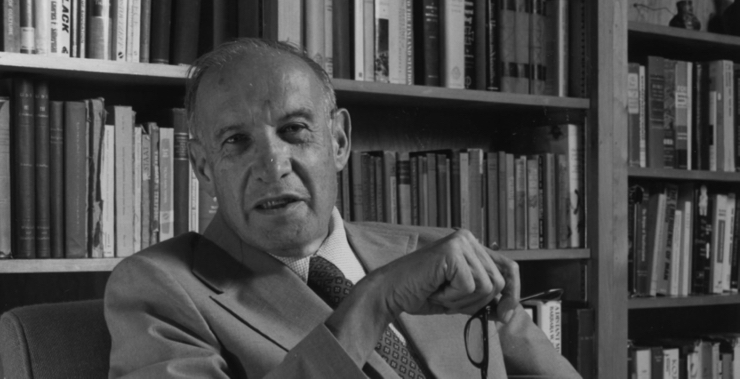Peter Drucker on Time: Our Most Important Resource

Some ideas have been so perfectly expressed by others that there’s really no point in trying to say them any differently. For example, here’s Winston Churchill on the nature of truth:
The truth is incontrovertible. Malice may attack it, ignorance may deride it, but in the end, there it is.
Wow, how powerful. Who’s going to top that? Not me.
Peter Drucker is generally considered the most influential management thinker of the 20th century, and in last week’s post, I praised his productivity classic The Effective Executive. The book is packed with wisdom on how to run your professional life (regardless of your title), but Drucker’s insights in The Effective Executive on the nature of time are especially compelling. Like Churchill’s comments on truth, they capture difficult ideas so well that paraphrasing is counterproductive. So rather than trying to channel Drucker, I’d like to share his thoughts with you directly. They’re below, with my comments.
Time is always the limiting factor
Effective executives know that time is the limiting factor. The output limits of any process are set by the scarcest resource. In the process we call “accomplishment,” this is time.
In the final analysis, it’s time that ultimately limits our achievement. We can turn this to our advantage, though—if a project is dragging on for lack of a deadline, we can use time to artificially constrain our projects. Publicly committing to a deadline or ship date not only ensures we’ll get the job done, it often increases the quality of our work as our focus sharpens to meet the deadline. If you’re struggling to get something done, set artificial limits on your time. Here’s an article I wrote on how to do so.
Time is a unique resource
Time is also a unique resource. Of the other major resources, money is actually quite plentiful. We long ago should have learned that it is the demand for capital, rather than the supply thereof, which sets the limit to economic growth and activity. People—the third limiting resources—one can hire, though one can rarely hire enough good people. But one cannot rent, hire, buy, or otherwise obtain more time.
We can’t get more time. We can get more money, more knowledge, more skills, more friends, more of almost anything. But not time.
Time is always needed, and it’s always scarce. I’ve found that when time doesn’t feel scarce to me—when it feels like I’ve got all the time in the world—it’s an indicator that I need to adjust my outlook to match reality. Reading Marcus Aurelius’ Meditations snaps me back to reality quickly.
Time is inelastic and perishable
The supply of time is totally inelastic. No matter how high the demand, the supply will not go up. There is no price for it and no marginal utility curve for it. Moreover, time is totally perishable and cannot be stored. Yesterday’s time is gone forever and will never come back. Time is, therefore, always in exceedingly short supply.
We cannot save time, not really. We’re forced to spend it, second by second.
Strangely, the best way to ensure we spend our future time well is to spend some of our present time planning our future. I’m perpetually amazed at how much time weekly planning saves, though it takes 60-90 minutes out of my Sunday evening.
Time is irreplaceable
Time is totally irreplaceable. Within limits we can substitute one resource for another, copper for aluminum, for instance. We can substitute capital for human labor. We can use more knowledge or more brawn. But there is no substitute for time.
This point is crucial. We think of many things as irreplaceable: our company’s biggest client, an electrifying leader in our organization, even the sugar in a recipe for chocolate chip cookies. But substitutes exist for all of these, even if they’re imperfect (like Splenda for sugar). Time is different. There’s no Splenda to time’s sugar.
There’s not even a Sweet’n Low.
(readers groan)
Sorry—that was bad.
Everything requires time
Everything requires time. It is the only truly universal condition. All work takes place in time and uses up time. Yet most people take for granted this unique, irreplaceable, and necessary resource. Nothing else, perhaps, distinguishes effective executives as much as their tender loving care of time.
The clock is always running. Every single thing we do—from ruminating on past mistakes to updating our CV to taking our children for ice cream—uses up time. Drucker is 100% correct that the most effective people take time management far more seriously than the masses. One of the central points of Drucker’s writing is that “effectiveness can be learned.” I’ll exhort you, as I usually do, to become a more and more advanced student of time management. Read Peter Drucker, read David Allen, read Neil Fiore, and read Stephen Covey. It’s all time well-spent.
As I wrote earlier, our lives are ticking away, one second at a time. Far from being morbid, I think this is actually a tremendously inspirational idea. The clock is running, and it won’t run forever. In the meantime, let’s see what we can do!
(Photo by Jeff McNeill [CC BY-SA 2.0 ], via Wikimedia Commons)